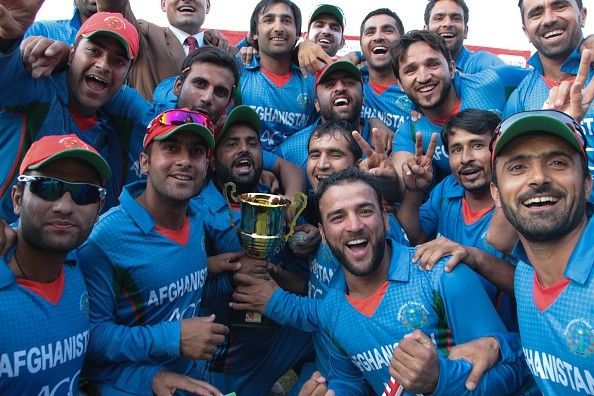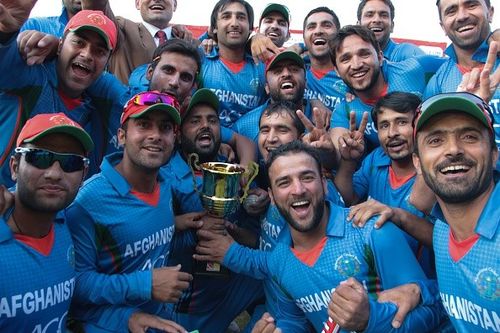
Banging on the door - Afghanistan send ICC a signal with Zimbabwe triumphs

The Afghani fairytale rolls on. The group of plucky outsiders, who have captured the hearts of cricket romantic years over recent years with their rise through the ranks, have secured their biggest scalp yet courtesy of last week’s 3-2 series victory over Zimbabwe. It was Afghanistan's first five-match One-Day International (ODI) series against a Test nation, but more importantly, a rare opportunity the team had to seize. And seize it they did, becoming the first Associate to down a Full Member side in a bilateral ODI series.
Then, if that wasn’t enough, they backed up the triumph by sweeping the Twenty20 series that followed, prevailing by handy six-wicket and five-wicket margins. The team showcased themselves as seasoned, consummate professionals, which is exactly what they have become.
The three leading run-scorers from the ODIs – Mohammad Nabi, Noor Ali Zadran and Mohammad Shahzad – were all Afghanis. They also chased targets of 154 and 191 in the T20s with the sort of ease you would expect from Australia, not Afghanistan.
While it’s easy to wax lyrical about the batting, the bowling – historically their strongest suit – is also rock solid. Despite the absence of star pacer Hamid Hassan, they kept Zimbabwe pinned down throughout the ODIs.
After a shaky start, Afghanistan restricted their African opponents to 184 in the fourth match, chasing it down with three wickets to spare, before nailing down a 73-run win in the decider after setting a testing, if not tumultuous target of 246. The clutch, economical bowling from the likes of Dawlat Zadran, Amir Hamza and Rashid Khan set the tone.
Zimbabwe are far from world beaters, but they are not mugs either, and to hand them such a humiliating loss on home turf is a huge blow.
Afghanistan are a different kind of Associate
Afghanistan’s efforts spoke of a side which has capitalised on the glimpses of major experience they have been offered and are hungry for more of them. Just a decade ago, the thought of playing Zimbabwe in an internationally-sanctioned match would have been a pipedream; now, as proven, it’s a bout which presents a very achievable scalp.
In fact, Afghanistan are making a habit of taking achievable scalps. In their maiden 50-over World Cup berth this year, their pool threw up a winnable match – against fellow Associate Scotland. The more seasoned team had featured in three World Cups before, but had failed to record a victory in eight matches. The game versus Afghanistan was also their biggest chance to make hey on the world stage. The all-Associate tie produced possibly the scenes of the tournament, as Afghanistan fought back to steal a famous one-wicket win. For Scotland, the painful defeat ensured World Cup agony would eventually extend to 14 matches.
That was a strong indicator that Afghanistan are not the typical Associate. When Associates make a breakthrough - take Netherlands’ T20 exploits for example – they invariably seem to fall back into the pack. Others never even get to enjoy a limelight moment.
Scotland have meandered in mediocrity for two decades; Afghanistan have strolled past mediocrity with aplomb. For them, it is always about the next step. By beating Zimbabwe in a lengthy battle, they have signalled their success is neither fortuitous nor fleeting.
The entire tour, which lasted a little under a fortnight, marked the most important passage in Afghanistan’s cricketing history. Forget the heartwarming tale which has storied their remarkable ascent, this crop of players have no interest in being known as also-rans or plucky outsiders, they want a starring role in the sporting party. To reach that goal, they have to overcome a foe who should really be their friend. It’s a sad indictment that cricket’s governing body is all too often a hindrance, rather than a help.
Along with Ireland, Afghanistan must keep showing the ICC they belong
With the ICC intent on keeping their pinnacle events a closed shop, the "Minnows" - a term which is perhaps disdainful given their improvements over the past decade - are faced with little other choice. Instead of politely knocking the door, they are going to have to boot it down.
When glimpses of hope present themselves against Bangladesh, Zimbabwe and a straggling West Indies, walking away with anything less than a win is no longer sufficient. Merely being competitive or putting the frighteners on the Establishment before eventually succumbing, simply reaffirms the ICC's point that their most prestigious tournaments should be solely for the sport's elite.
As T20 is cricket’s new cash cow, the Associates are even seeing the ODI game – the format that made Kenya a World Cup semi-finalist just 12 years ago - float off into the distance. For that reason alone it’s imperative that Afghanistan and Ireland excel, to justify the Associate cause. Not only do more contests with the best support them, it’s invaluable competition for the lesser Test nations too.
While many pour scorn over the touted two-tier system, if it leads to more closely-matched games, it’s inevitable that all teams will make strides. Bangladesh has been on the Test scene since 2000, but they haven’t benefitted from being pummelled time and time again. Only recently have the Tigers found their feet, while West Indies continue to hurtle towards oblivion.
The appointment of Pakistan’s former batting supremo Inzamam-ul-Haq is another fascinating play. The feisty 45-year-old will undoubtedly impose his bullish, confident nature on his cricketers. The move already looks to be paying dividends and, if Afghanistan are to press on in the coming months and years, his influence is likely to play a key role. Bangladesh have shown just how important it is to have the right person in charge. Under Jamie Siddons, the team reached new heights, but after his departure they slipped - for a while, at least - back into the doldrums.
Afghanistan will hope that Inzamam is the perfect fit and the early signs suggest he is. He notes their passion and desire - such traits make great sports teams. Their attitude is exemplary and it will continue to stand them in good stead. There are no egos or slackers, the Afghanis have perfected the art of playing as a team – something few outfits in any sport truly manage.
Afghanistan’s time as the occasional upset-maker is over. Now, like Ireland, they are establishing themselves as a team which cannot only challenge the best, but beat them on an increasingly regular basis. The latest chapter in Afghanistan’s incredible story has begun.